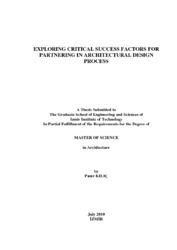Please use this identifier to cite or link to this item:
https://hdl.handle.net/11147/3517Full metadata record
| DC Field | Value | Language |
|---|---|---|
| dc.contributor.advisor | Doğan, Sevgi Zeynep | - |
| dc.contributor.author | Kılıç, Pınar | - |
| dc.date.accessioned | 2014-07-22T13:51:43Z | - |
| dc.date.available | 2014-07-22T13:51:43Z | - |
| dc.date.issued | 2010 | - |
| dc.identifier.uri | http://hdl.handle.net/11147/3517 | - |
| dc.description | Thesis (Master)--İzmir Institute of Technology, Architecture, İzmir, 2010 | en_US |
| dc.description | Includes bibliographical references (leaves: 98-108) | en_US |
| dc.description | Text in English;Abstract: Turkish and English | en_US |
| dc.description | xi, 112 leaves | en_US |
| dc.description.abstract | Partnering is common to construction companies and success increases by effective partnering. Objective of this thesis is to analyze the critical success factors of partnering and to determine the most important critical success factors of partnering particular to architectural design offices in .zmir. For this purpose, a questionnaire survey is conducted for 104 practicing architects in .zmir. The collected data are analyzed with factor analysis and multiple regression methods. By factor analysis, 7 critical success factors of partnering are determined for the architectural design process. These are; (1) establishment of efficient communication towards mutual goals, (2) willingness to effective coordination, (3) commitment to mutual objectives by clear definition of responsibilities, (4) willingness to eliminate non-value added activities, (5) commitment to win-win attitude by focusing on long-term relationship, (6) mutual trust and (7) support from top management. Multiple regression analysis is conducted to identify the most important critical success factors for partnering success of the architectural design process. The results of the regression analyses suggest that architects state the most important critical success factors leading to partnering success to be respectively as follows: (1) willingness to effective coordination, (2) willingness to eliminate non-value added activities and (3) commitment to win-to-win attitude. | en_US |
| dc.language.iso | en | en_US |
| dc.publisher | Izmir Institute of Technology | en_US |
| dc.rights | info:eu-repo/semantics/openAccess | en_US |
| dc.subject.lcsh | Architectural design--Case studies | en |
| dc.subject.lcsh | Architectural partnership | en |
| dc.title | Exploring Critical Success Factors for Partnering in Architectural Design Process | en_US |
| dc.type | Master Thesis | en_US |
| dc.institutionauthor | Kılıç, Pınar | - |
| dc.department | Thesis (Master)--İzmir Institute of Technology, Architecture | en_US |
| dc.relation.publicationcategory | Tez | en_US |
| dc.identifier.wosquality | N/A | - |
| dc.identifier.scopusquality | N/A | - |
| item.openairecristype | http://purl.org/coar/resource_type/c_18cf | - |
| item.cerifentitytype | Publications | - |
| item.fulltext | With Fulltext | - |
| item.languageiso639-1 | en | - |
| item.grantfulltext | open | - |
| item.openairetype | Master Thesis | - |
| Appears in Collections: | Master Degree / Yüksek Lisans Tezleri | |
Files in This Item:
| File | Description | Size | Format | |
|---|---|---|---|---|
| T000841.pdf | MasterThesis | 1.19 MB | Adobe PDF |  View/Open |
CORE Recommender
Page view(s)
246
checked on Apr 28, 2025
Download(s)
112
checked on Apr 28, 2025
Google ScholarTM
Check
Items in GCRIS Repository are protected by copyright, with all rights reserved, unless otherwise indicated.